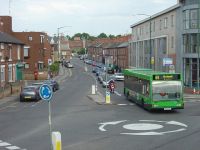Basford /ˈbeɪsfərd/ is a northerly suburb of Nottingham, England, incorporated into the city in 1877. It gave its name to Basford Rural District, which existed from 1894 to 1974. The ward population at the 2011 census was 16,207, estimated at 16,779 in 2019. Next to Old Basford is New Basford, which is mainly Victorian. Basford lies close to the River Leen, a tributary of the River Trent. It is linked to Nottingham City Centre to the south and Hucknall and Bulwell to the north by the Nottingham Express Transit tram service.
History
Close to Basford Register Office is the site of a former workhouse. This was used for Basford and for neighbouring parishes. The workhouse later became a maternity hospital and then a psychiatric hospital.
Near Vernon Park there used to be a complex of high-rise flats which consisted of horizontal and vertical blocks connected by aerial concrete walkways. These were demolished in 1983.
Basford has a range of shops in its extensive area. Home to Vernon Park, Basford also has football teams who play there. There is a Bulwell and Basford Rotary Club.
For many years one of the largest industries in Basford was soap manufacturing – a factory was established in the 1890s by Gerard Bros., which in 1955 was acquired by Cussons Sons & Co, manufacturer of Cussons Imperial Leather soap. In 2005 the factory was closed and production moved to Thailand.
Basford was well served by railways, with three stations bearing its name in one form or another. Basford Vernon was the earliest, on the Midland Railway's Nottingham to Mansfield Line. The next to be built was Basford North on the Great Northern Railway, which was originally called Dob Park from the land it was built on, then later Basford & Bulwell. Finally came New Basford on the Great Central Main Line. Basford North and New Basford closed along with the lines on which they were situated. Basford Vernon closed in 1964 but the line on which it stood remained open for freight and was subsequently
